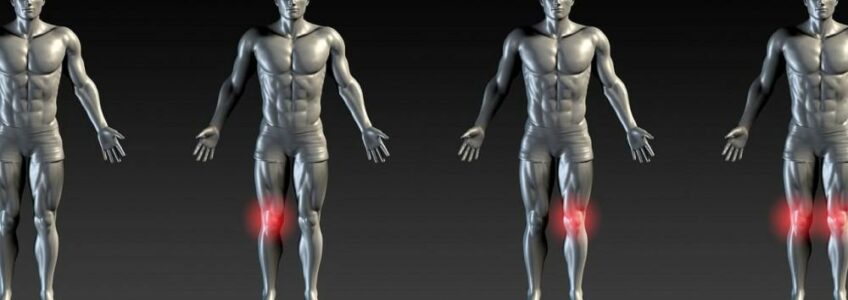
Your knees are an essential part of your body. With a series of tendons and connective tissue, your knees allow you to perform crucial tasks every day. From walking, going up some stairs, sitting down, standing up, and so much more.
If you have suffered a knee injury, it is important to know the difference between an ACL tear and an MCL tear. ACL stands for anterior cruciate ligament and MCL stands for medial collateral ligament. Both of these ligaments are located in the knee and they serve different purposes, so it is important to understand the difference between an ACL tear and an MCL tear in order to properly treat the injury.
Anatomy
The knee is a very complex structure consisting of many ligaments, tendons, cartilage, bones, and other soft tissues working together in harmony. Any suspected injury to the ACL should be evaluated by your doctor or an orthopedic knee specialist for appropriate diagnosis and treatment.
Your knee joint is formed where three bones meet: your femur (thighbone), tibia (shinbone), and patella (kneecap). Your kneecap sits in front of the joint to provide some protection. Bones are connected to other bones by ligaments. There are four primary ligaments in your knee and they act like strong cords to hold the bones together and keep your knee stable.
What is a Ligament?
Ligaments are the fibrous connective tissues that hold joints together. More plainly, ligaments are what hold bones together. Under normal amounts of stress, ligaments will keep a joint moving smoothly in proper alignment. You have ligaments in your knees, shoulders, elbows, ankles, wrists, hips, and other joints.
What Is An ACL Tear?
The anterior cruciate ligament, or ACL, is located in the middle of your knee and is responsible for steadying the knee, keeping the knee from turning too much and preventing the tibia from overextending itself. ACL injuries commonly occur while playing sports that involve sudden stops or changes in direction, such as basketball, soccer, tennis, or football.
Injuries can range from overextending the ligament to a full tear. A mild injury may strain the ligament but keep it intact. Moderate to severe injuries can cause a partial or full tear of the ligament. You will likely hear a “popping” noise if that type of injury occurs. You may experience swelling or be unable to put weight on the injured knee.
What Is An MCL Tear?
The MCL, or medial collateral ligament, runs long the inside of your knee and prevents the leg from over-extending inward, but it also is part of the mechanism that stabilizes the knee and allows it to rotate. It also connects your shin to your thigh bone. Athletes who play high-contact sports like football or hockey may injure the MCL when colliding with another player. The MCL is often injured when the outer knee is hit very hard, causing strain on the inner knee.
When the knee is twisted, bent, or pushed to the side in an unnatural way, the ligament will stretch and result in a partial or full tear. You may hear a popping sound, followed by pain and swelling along the inside of the knee.
Which Is Worse, an ACL Tear or an MCL Tear?
In most cases, ACL tears are more serious than an MCL injury. Oftentimes, an MCL injury can resolve without the need for surgical treatment. However, a torn ACL frequently requires surgical treatment. Not every ligament tear will require surgery. Many ligament tears, if they are mild, can recover from rehabilitation and physical therapy alone.
These common knee injuries may seem like no big deal, but it is extremely important to take good care of your injured knee. Failing to do so could lead to further damage, a worse injury than you started with, and it may require surgery. The longer you wait to seek treatment for your ACL or MCL tear, the worse it will be.
Can You Walk with an ACL or MCL Injury?
While one may be able to walk after sustaining an MCL injury, the knee feels unstable and may catch during movement. Diagnosing a torn MCL will involve a doctor pushing on the knee to determine how severe the strain or tear is. If the knee injury is not too severe, you should still be able to walk, although you may need a knee brace to do so.
However, expect to feel pain when you bear weight on the injured leg. You should still be able to walk with a sprain or a partial tear, but this may not be possible with a full MCL tear or ACL tear. Consult with your doctor to determine whether or not you can and should walk after a knee injury.
What Are the Causes of an ACL Tear?
Most ACL injuries happen while playing sports or other physical activities that can put stress on the knee:
- Stopping or changing directions suddenly when running
- Pivoting when your foot is firmly planted
- Landing from a jump incorrectly
- A direct hit to the knee
What Are the Causes of an MCL Tear?
Sudden and forceful turning, twisting and “cutting” can cause MCL tears. A direct blow to the outer side of your knee can also cause an MCL tear. MCL tears are most common in people who play certain sports like skiing, football, basketball and volleyball.
The following situations can cause an MCL tear:
- Planting one foot into the ground and forcefully shifting direction (this is known as “cutting” in sports).
- When something or someone hits your knee on its outer side, such as from a football tackle.
- Squatting or lifting heavy objects.
- Landing awkwardly on your knee after a jump.
- Hyperextending (overstretching) your knee. This is common in skiing.
- Repeated pressure and stress to your knee, which causes your MCL to lose its elasticity (like a worn-out rubber band).
ACL Tear Symptoms
The signs and symptoms of an ACL tear are distinctive. They usually include the following.
- Knee swelling
- Knee instability
- Sharp pain
- A popping sound
- Loss of range of motion
If you suspect an ACL injury, contact your doctor right away.
MCL Tear Symptoms
Symptoms of MCL injuries are very similar to the symptoms of ACL injuries. Patients with MCL tears usually have the following symptoms.
- The knee feels unstable while bearing weight
- Extreme pain
- Significant swelling
- Catching or locking of the knee joint
Did I Tear My ACL or MCL?
You know that you sustained one of these two knee injuries, but how can you tell the difference between the two? On your own, it can be very difficult to tell the difference between ACL and MCL tears. However, there is one major difference between the two. When you suffer an ACL tear, there is a very high chance you will hear or feel a popping sound or sensation. An MCL tear generally will not produce this symptom.
Keep in mind that the only way to know for sure if you sustained an ACL or MCL injury is to speak with an orthopedic specialist. We can perform a physical examination and order imaging tests to confirm a diagnosis before developing a personalized recovery plan for you.
Treatment For ACL and MCL Tears
MCL tears are typically easier to recover from than ACL tears. With an MCL tear, the recovery process may take up to eight weeks or more with rehabilitation. On the other hand, an ACL tear will most likely require surgery and at least six months of rehabilitation or more.
Recovery from ACL and MCL Tear
Recovery from these injuries is very different. ACL tears almost always require surgical intervention to fix, and proper recovery can take 6 months to a year.
MCL tears, on the other hand, sometimes have the ability to heal without surgery requiring just a course of physical therapy. If surgery is required to repair your MCL, the recovery process will not be as long as for an ACL repair recovery and will usually only last a few weeks or months.
Call Ventura Orthopedics Today!
If none of these changes or even rest help ease the pain, contact your Ventura Orthopedics provider to make sure there is not something more serious behind the aches. You don’t want knee pain or injuries to hold you back from living an active life! Our board-certified orthopaedic surgeons specialize in knee, foot and ankle surgery and deal with both common and complex disorders associated with running.
If you are experiencing pain associated with knee injuries that need professional help, contact Ventura Orthopedics or to schedule an appointment with one of our hip replacement specialists, call us at 800-698-1280.

